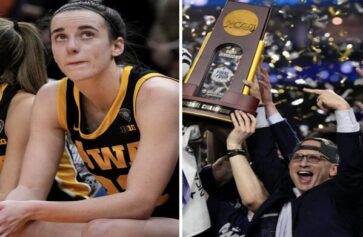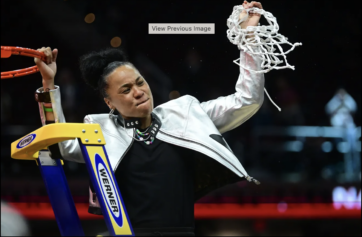Last Wednesday, a few weeks after a resurgent UMass program's season came to an end in the first round of their first NCAA Tournament trip since 1998, UMass guard Derrick Gordon gathered the courage to do something he had contemplating since his freshman year at Western Kentucky and came out the closet to his teammates.
However, the method head coach Derek Kellogg used to break the ice for Gordon to make his announcement is actually pretty amusing.
Via ESPNW's Kate Fagan:
Kellogg spoke first. "We're all here together, and we need to love each other for who we are," he said. "One of your family members, your brother, wants to let you know something about himself."
There was a pause. And then Kellogg, sensing that Gordon needed help, tried breaking the ice. "I wanted to let you all know I'm gay," the coach said. His players all looked at him, stunned. What?
Gordon took his cue and spoke up.
"No, he's not. But I am."
Two days prior to telling his teammates, Gordon came out to his parents. He asked his parents to guess and after a few rounds of Crossing Over with Derrick Gordon, his mother blurted out "are you gay," and Gordon confessed. His father struggled with it, but his mother admitted that she was always had an inkling he was gay. That was followed by a confession to his fraternal twin, Darryl and older brother Mike.
Mike didn’t get shook by the news. His brother Darryl, who is entering the final months of his 2009 sentence for attempted murder at the age of 16 for shooting a neighborhood man at point-blank during an altercation didn’t take the news as well.
Derrick visited Darryl in prison, broke the news and his twin digested the news overnight before calling Derrick the next day.
"I've been crying," Darryl told his brother. "This is something I can't believe. This can't be you. Maybe you need counseling?"
Since coming out to his teammate, Gordon has felt a calm relief overtaking him.
"I've always loved sports, but always felt I had to hide and be someone that I'm not," said Gordon in a statement released Wednesday. "For my whole life I've been living my life as a lie. I am telling my story so that athletes never feel like they have to hide. You can be true to yourself and play the sport that you love."
Here we go again. Does anyone really care?“@SportsCenter: UMass G Derrick Gordon announces that he is gay. » http://t.co/QjTHqMMhN9”
— Matt Lawrence (@mattlaw2482) April 9, 2014
For the inevitable “who cares” and myopic “why not keep it to yourself?” comments that will pop up, you can analyze the common thread between Derrick Gordon, and Michael Sam, who also came out to the world in February. The noticeable shift in their demeanors after coming out to teammates isn’t a coincidence.
"Before DG even said anything, I could sense that a weight was lifted from him," sophomore center Tyler Bergantino said. "He looked like a different person — happier, stress-free, like that was the real him. Before, when he would walk into the locker room, there was this cloud around him, like you couldn't quite get to him."
According to Bergantino, who roomed with Gordon during his redshirt season two years ago, Gordon was unusually reserved around his teammates.
"At first, we all would say, 'Come on, come on, come out with us tonight! Come out to eat.' But he would always say, 'Nah, I'm just going to chill here. I'm tired.' It got to the point where that's what he said every time. And we just thought he wasn't the kind of guy who wanted to do stuff in a group." Bergantino said.
Most closeted athletes struggle to deal with the constant pressure to keep this secret to themselves, which could be a mentally exhausting charade to keep up. Self-disclosures regarding sexuality has the potential to fracture families and relationships with lifelong friends. Based on the varying possible reactions, Gordon had no idea what to expect. Michael Sam’s father initially distanced himself from his son before coming around to supporting his son.
According to Gordon, the mental burden of holding onto the secret may have affected his court performance. When a photo surfaced of him in front of a gay club in New Jersey, Gordon inexplicably "like" the photo he wanted hidden online. As a result of Gordon's digital action, the photo came to his teammates' attention. They teased him about it while Gordon went into denial mode, retreated into the closet and dismissed the photo, but was breaking down emotionally.
"That was probably the lowest point I was ever at. I didn’t want to play basketball anymore. I just wanted to run and hide somewhere. I used to go back to my room and I'd just cry. There were nights when I would cry myself to sleep.
Via Outsports:
Gordon did feel safe in New York City, where he would venture out to gay clubs. He spent this past New Year's Eve in the gay clubs of Manhattan — getting no sleep and taking two trains to get there — simply to be in an environment where he felt he could be himself, anonymously. A couple times in the last year someone did recognize him in a gay bar, driving him deeper into the closet and depression.
"It was the worst four years of my life," Gordon said, despite the accolades and opportunities he's received in those four years. "It was torture. I was just going around faking my whole life, being someone I'm not. It's like wearing a mask because everyone else was wearing that mask. Now that I'm taking the mask off, people can finally see who I really am."
Whatever you thought of the Brooklyn Nets' signing of Jason Collins, the symbolism played a major role in Gordon's decision to unburden himself. Before, Gordon somewhat tossed aside the notion of following in Collins' footsteps because the Nets center was no longer an active professional basketball player. Witnessing Jason Collins receive a standing ovation and supportive cheers during his Nets debut stirred up the confidence in Gordon's young, impressionable mind to come out after the season's culmination.
The fact that Gordon’s disclosure went relatively smoothly is a message that athletes contemplating living an openly homosexual lifestyle need to hear for positive affirmation.



